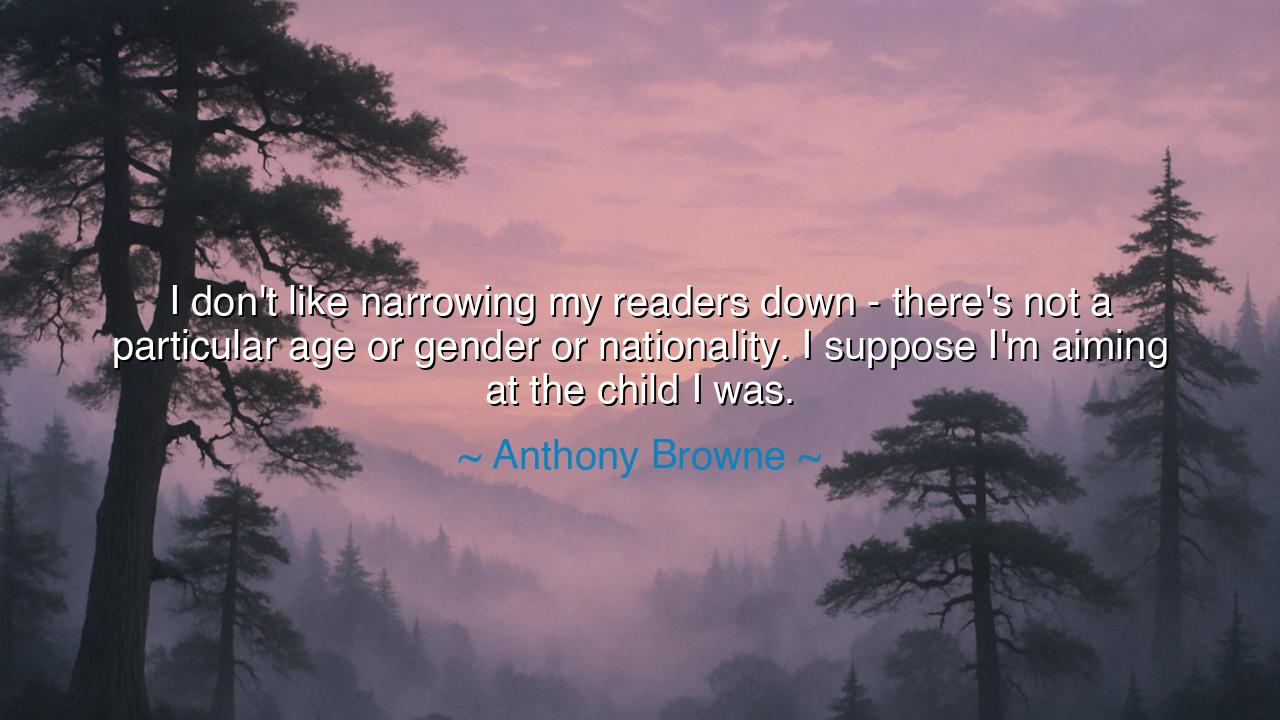
I don't like narrowing my readers down - there's not a particular
I don't like narrowing my readers down - there's not a particular age or gender or nationality. I suppose I'm aiming at the child I was.






In the words of Anthony Browne, “I don't like narrowing my readers down – there's not a particular age or gender or nationality. I suppose I'm aiming at the child I was.” These words shine with gentle wisdom, carrying the essence of what it means to create from the soul rather than for the world’s approval. Browne, the beloved author and illustrator whose books have stirred the hearts of children and adults alike, speaks here not as a writer limited by category, but as a storyteller of the human spirit. His words remind us that true art, when born from sincerity, transcends all boundaries—it belongs to everyone, because it springs from what is most universal: the child within us all.
To aim at the child you were is to write, speak, and live from the place of wonder that time too often silences. It is to remember the world not through cynicism or pride, but through curiosity, empathy, and awe. Browne’s message is not merely about literature—it is about life itself. He reminds us that within each adult lies a younger self, still yearning to understand, to dream, and to feel seen. When he creates, he does not target an audience of age or identity; he reaches inward, to the boy who once looked upon the world with both fear and fascination, and he writes to him. In doing so, he speaks to every person who has ever been a child—which is to say, he speaks to all of humanity.
This sentiment echoes the wisdom of the ancients. The philosopher Socrates once said that “education is the kindling of a flame, not the filling of a vessel.” Browne’s words reflect the same truth. To reach others deeply, one must speak to the flame within them—the part that has not forgotten how to wonder. When artists, teachers, or leaders create only for categories—“for children,” “for men,” “for women,” or “for the young”—they forget that the truest language is the one that unites all hearts. The childlike spirit within us, unguarded and pure, is what makes us capable of joy, of learning, and of compassion. It is the bridge that connects one soul to another, beyond all divisions of age or nation.
Consider the life of Antoine de Saint-Exupéry, the author of The Little Prince. He too wrote a story that seemed, on the surface, to be for children. Yet his tale of the small prince who loved a rose and searched the stars speaks profoundly to the grown and weary. It is a story not bound by time or culture, but by the universal truth of love, loss, and wonder. Saint-Exupéry, like Browne, was not aiming at an audience defined by age—he was aiming at his own inner child, and in doing so, he touched the world. The child he was became the compass that guided the man he became.
Browne’s rejection of narrowing readers also carries a deeper humility. It is an acknowledgment that once a story leaves the creator’s hands, it belongs not to one group, but to whoever needs it most. The act of creation, whether in art, in teaching, or in love, is not about control—it is about offering something true and letting it find its home in the hearts of others. His philosophy is a call to freedom: do not limit your expression by who you think will understand, but trust that what is genuine in you will find what is genuine in others. The soul recognizes truth instinctively, as the child recognizes kindness.
In a world that constantly divides—by age, gender, nationality, and creed—Browne’s wisdom feels like an ancient reminder that what unites us is far stronger than what separates us. The child we once were is the root of our empathy. It is the part of us that still believes in fairness, still marvels at beauty, still feels awe in the face of mystery. To live in touch with that part of ourselves is to live fully human, unguarded and sincere. And it is through that inner child that we are best able to understand one another, for the language of innocence is universal.
The lesson, my child, is this: do not forget the child you once were. In your work, your art, your words, and your relationships, let that part of you speak. It will remind you to stay open, to be kind, and to create not for recognition, but for connection. When you tell your story, do not tailor it for approval—tell it for the younger self who first dreamed of what could be. For when you honor the child within, you honor the truest part of yourself—and in doing so, you will find that your words, like Browne’s, can cross every border and touch every heart.
So remember Anthony Browne’s wisdom: the greatest audience is not defined by numbers or categories—it is defined by sincerity. The child within you is both your oldest teacher and your purest muse. Nurture that voice, and it will speak not just to one age or nation, but to the timeless spirit shared by all who still have the courage to wonder.






AAdministratorAdministrator
Welcome, honored guests. Please leave a comment, we will respond soon